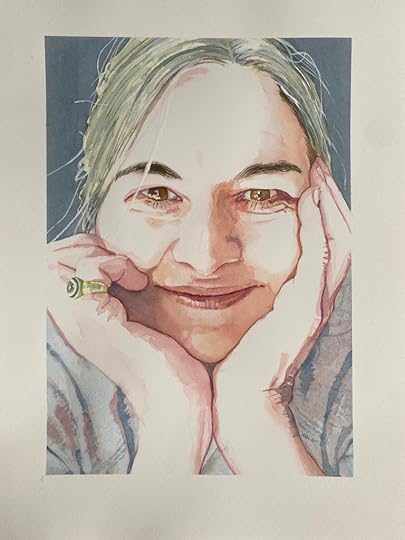Ian Probert's Blog
November 22, 2024
I hope I live until I die
When death pokes you in the ribs
As a rule I don’t respond to No Caller ID. But for some reason that afternoon I did. I immediately regretted doing so. It’s very serious, said a foreign sounding voice. Your heart is only working at 25-30% efficiency. You need to come in immediately for a scan. We’re going to put you on four different medications. You’ll need to take these for the rest of your life. Do you drink? You must stop right away. You mustn’t touch alcohol ever again. The call lasted exactly 6 minutes and 52 seconds.
It’s no great secret that we all know that we’re going to die. That we carry with us a death sentence. It’s said that this degree of self-awareness is one of the things that makes us human, that separates us from dogs and cats and mongooses and elephants and fleas. We are all aware that we have a finite lifespan. But until it smacks us in the mouth this knowledge is something that most of us tend to keep in cold storage as we go about the business of living. We shop. We eat. We work. We play. We marry. We divorce. We clean our teeth. We do the large and small things that make up a lifetime. Things that would probably be impossible to do if we just sat in a corner somewhere fretting about dying.
But all of a sudden that’s exactly what I was doing. A stranger had just phoned me and told me that death was eminently more imminent that it had been less than seven minutes earlier. He’d also told me that I wasn’t allowed to open the bottle of red that I’d bought that morning for a little companionship. I needed to talk. I needed to vent. So I called my mother and then I called my sister.
We’ve all heard of the placebo effect. But what I hadn’t heard of until I Googled it was its opposite: the nocebo effect. It’s a Pavlovian thing. Tell somebody they’ve got something wrong with them and there’s a fairly good chance that they soon will have. When I awoke the next morning I was suddenly very aware of the existence of my heart as I never before had been. That it was a fist-sized muscle buried away in my chest pumping away as if my life depended on it. Every minor twinge, every minuscule change in heart-rate was magnified a thousand times. I found myself occasionally wincing and holding my chest at imagined palpitations. Yes, I told myself, my heart definitely isn’t working properly – so what happens next? I didn’t have to wait too long to find out.
There were texts – lots of them. A flood of them. And call after call from more No Caller Iders. From my GP – telling me that I’d been prescribed this or that drug. From the cardiology department at the nearest hospital urging me to pay them a visit at my earliest convenience. From someone at the prosaically named Heart Failure Clinic, who wanted to see me as soon as possible. The calls and texts kept on coming. And with them came conflicting emotions. There was definitely gratitude – I was both grateful and impressed that the NHS had kicked into action so efficiently. Although such palpable enthusiasm only served to increase my concerns. Surely they wouldn’t be acting so speedily if it wasn’t serious? And there was fear – without warning the world had suddenly changed. It had grown smaller. Somehow there was less of it than there was a day earlier. I wanted to scream: Leave me alone!! I didn’t ask for this!! I’ve done nothing to deserve this!! Stop picking on me!!
I also began assembling a mental checklist. I thought about wills. I’d better write one before it’s too late. I considered changing my lifestyle. My diet. The amount of exercise. Most of all I thought about my daughter. Twenty-one. Was I supposed to reveal all about my misfiring organ? What would be the point in worrying her and risking disrupting her studies? But what if I didn’t tell her and suddenly dropped dead? Would she think that her late father was a selfish bastard for keeping her in the dark? I considered making some kind of grandiose Facebook announcement: Before I pop my clogs in a week or so I’d like to apologise to all the people I’ve hurt or offended. I wasn’t such a bad sort. Honestly.
***
Within days I found myself lying on a giant piece of tissue paper with a cannula hanging from a vein. Naked from the waist up, I was wedged into a giant tube and radiation was fired at me. We’re going to put some dye into you that will show up under X-ray, an impossibly youthful technician explained. Most people say that they suddenly feel very hot for a few seconds. I must warn you that there is a chance of extreme reaction but this only occurs in about 1% of cases. While he retreated to the safety of a lead-lined observation room I lay stock still and felt the liquid enter my body. It crept up my arm like a line of marching ants before disappearing into my chest cavity. I suddenly felt icy cold and there was a strange taste in my mouth – somewhere between a cheap curry and that copper taste you get on your fingers after playing the penny arcade. I felt the need to vomit.
Next port of call was the Heart Failure Clinic. Why do you have to call it that? I asked an engaging heart specialist named Becky. Can’t you call it the Heart Treatment Clinic or the Healthy Heart Clinic? I was given a weak smile and some leaflets about heart disease for homework as she frowned into a computer screen.
By now things were happening fast. The calls intensified – sometimes twice, three times a day. Two different doctors asking me endless questions. Two heart specialists. A heart surgeon. It quickly reached the stage in which I dreaded my phone ringing. There were more texts. A tsunami of emails informing me on a regular basis that my ‘health record had been updated’.
I started to feel ill. I’d been taking two new medications for about four days and I was overwhelmed by exhaustion. On a number of occasions I slept for 20 hours at a stretch. Prior to this I’d been completely asymptomatic. You’d never have known that my heart wasn’t ejecting blood in sufficient quantities. Now, if I did manage to get out of bed it was usually to rush to the toilet. The universe was really sticking it to me – diarrhoea was but one of many unpleasant side-effects of the drugs I had been imbibing.
Two weeks of calls and texts and emails and exhaustion and the trots did nothing to improve the air of despondency that hung around me in a visible cloud. With the end of my life suddenly a very real possibility I began to reflect on what I’d actually done with it. Nothing really. A failed marriage to a woman I should never have married. A handful of stupid, poorly-written pamphlets with my name on their spines. All the things I could have done but didn’t. All the places I should have visited but never did. The people I’ve been mean to, intentionally or otherwise. And my daughter – probably the only pinprick of light in 62 years of murky grey. And then I had an epiphany.
It was the evening before I was due to go into hospital to have a stent fitted. I had been informed that my malfunctioning organ was undoubtedly due to the cavalier manner in which I had treated it. I had smoked and drank far too much and managed to clog up my arteries with grease. A stent was essential to my survival. Up until this moment I had been taking everything that had been thrown at me with barely a whimper. If they said: take this, I took it. If they said do this, I did it. But all of a sudden I stopped and thought for a moment.
What, I asked myself, would be my advice to a friend if they were in my position? What would I tell them to do? The answer to this question was research, research, research. Don’t rely on others, I would have said. Don’t take what they tell you as gospel until you’ve found out about it for yourself. And stop shoving stuff down your throat until you know exactly what it is doing to you. So I sat down and began some heavy-duty Googling.
The next morning I was sitting on a hospital bed wearing a paper nappy. As this was eased to one side and I was relieved of my pubic hair I caused a minor fracas by asking to speak to the heart surgeon before I would agree to having the stent fitted. There was a lot of whispering in the ward before the surgeon in question reluctantly appeared and impatiently thrust a consent form in my direction. I told him that before signing I needed to be convinced that the procedure was really necessary. I insisted that my research indicated few tangible differences between those fitted with a stent and those without. He frowned and issued the type of monologue that a teacher might offer a naughty schoolboy.
I was wheeled into an operating theatre and another cannula was inserted into a vein. Six or seven doctors, nurses and/or surgeons crowded around me as I did quite possibly the bravest thing that I have ever done in my entire life and refused the offer of a sedative. I was determined to stay as alert as possible for whatever was about to happen next. A screen hovered above me which enabled me to finally get a good look at the object that had been causing me all this misery.
Onscreen my heart looked grey and unremarkable. A large chunky vein was connected to its pulsating mass. It looked a little like the face-hugger that had attached itself to John Hurt’s boat race all those years ago. It was at this point that the room fell silent and I looked on as the heart surgeon I had earlier spoken to conspiratorially beckoned his colleagues toward him. There was much whispering and puzzled expressions. There was a lot of leaning into screen and noses pressed against glass. Finally, the heart surgeon turned to me and announced: There’s no evidence of significant heart disease or blocked arteries. We won’t be fitting a stent… I’ll be writing to you about it.’
It took three or four days for the letter to arrive. And it did indeed confirm that my malfunctioning organ was not the result of any kind of party lifestyle. It was something a whole lot weirder: apparently I am a freak.
Most people, it seems, are born with two major coronary arteries. Their job is to furnish the heart with a healthy supply of the red stuff so that the rest of the body is adequately supplied with O2. In my case I appear to have been born with only one artery. I don’t have a left coronary artery and never have done. It’s a rare condition that affects only 1 in 300,000 people. Moreover, 90% of those born with the affliction usually die within the first year. In my case, so the letter explained, my right coronary artery seems to have kicked into overdrive and grown to several times its normal size in order to compensate for being an only child. Even so, it’s only been able to supply roughly 30% of a normal person’s needs. Nevertheless, I’m 62 and still hanging on – so it’s safe to say that it’s been doing a fair to middling job so far.
It goes without saying that it took me a while to process this information. I found myself trying to retrace my steps through life – had there ever been anything to indicate a problem with my ticker? Not really. I was never particularly sporty but not for any physical reason. I’d never had a heart attack or even minor palpitations. In fact, I’d been perfectly OK until they started dishing out all these meds that were supposed to make me feel better.
And this was the first thing I addressed. How many people have you come across with my condition? I asked Becky the heart specialist. None, came the response. So how do you know that all these things you’re giving me are not doing more harm than good? There was silence for a few moments as she considered my words. I see your point, she said finally.
I went into a long spiel about there being no one-size-fits-all treatment for my condition. That I would prefer to listen to what my body is telling me rather than follow the advice of arbitrary text books. That I didn’t actually have heart failure (it was somehow particularly important for my morale that I no longer had to attend the Heart Failure Clinic). That from my body’s perspective my heart was completely normal. She may have been humouring a condemned man desperately clutching at straws but Becky quietly agreed with everything I said.
That conversation was a month ago. Since then I’ve stopped taking the meds that had been making me feel so ill and I’m back feeling how I did before the hospital discovered that I was on the verge of death. Nevertheless, a whole year of my life has been stolen by these substances. The texts and the phone calls and the hospital scans and the endless blood tests may have slightly abated but I still tend to flinch when my phone rings. I’ve done further research on my condition and discovered that the oldest female survivor is 88 and the oldest male is 74. The clock, therefore, is ticking – even if my heart is not.
In December I am scheduled to have a heart MRI in London. This, apparently, is the de facto standard heart scan. They are doing this to determine once and for all the damage that my heart has sustained during a lifetime of blood starvation. Everything I’ve read seems to suggest that when this is over I will have a decision to make: will I allow them to cut me open or not?
Your condition is so rare that there’ll probably be a lot of doctors who’ll want to have a poke around… somebody called a ‘heart scientist’ recently told me during an off-the-record chat. I wasn’t sure if he was joking or not but what I do know is that immediate heart surgery is usually recommended for somebody with my condition.
I want to live. We all want to live. However, the big question looming over me is do I want to live enough to allow my chest to be sliced open, my ribs broken and that life-sustaining piece of meat to be fiddled with by the fingers of a stranger? Right now I’m erring on the side of no.
As this decision awaits me I’m also forced to reconsider my life. To reflect on how lucky I have been to squeeze six decades of activity out of a life that could and should have been over before it even began. To have had the opportunity to experience those major and minor things that we all take for granted. More importantly, to decide how not to waste whatever time I have left on planet earth. How to live until I die.
September 25, 2023
Everything but the grill
An interview I did back in 2018 with former two-time heavyweight champion George Foreman. Well worth the price of a transatlantic phone call.
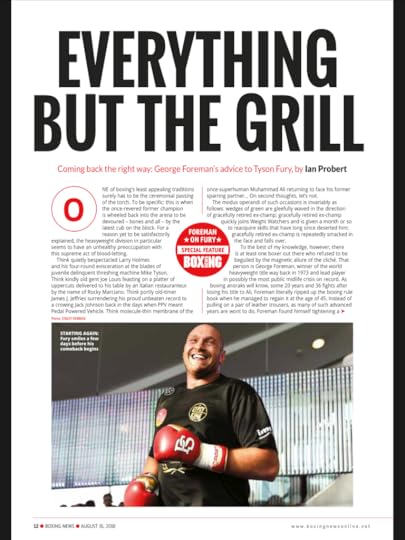
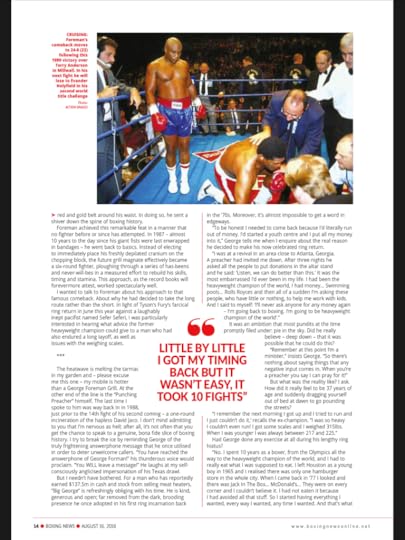
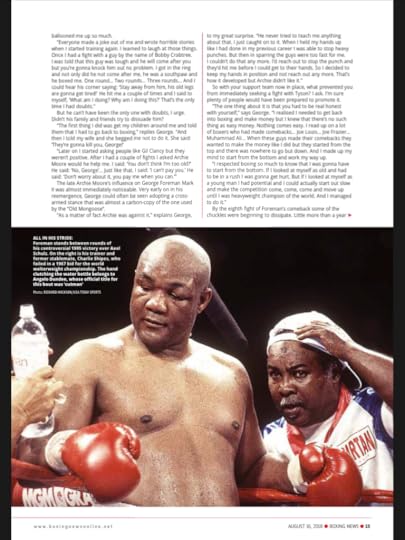
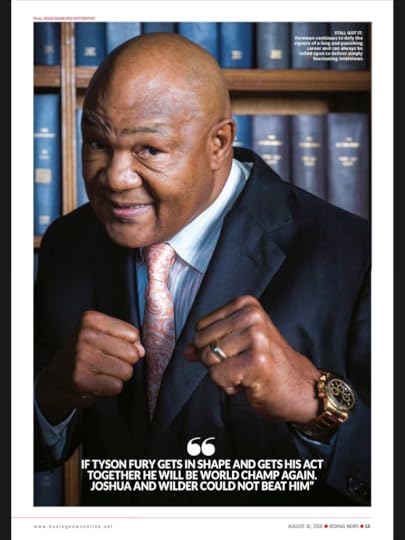
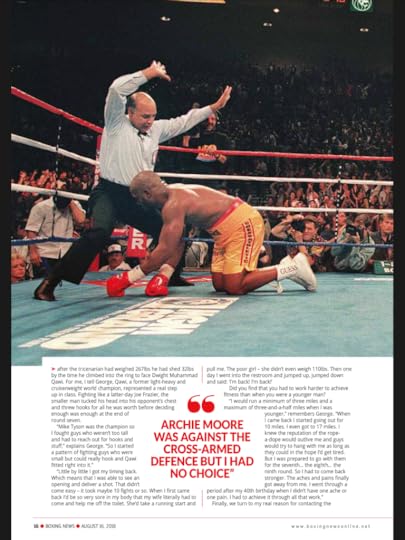
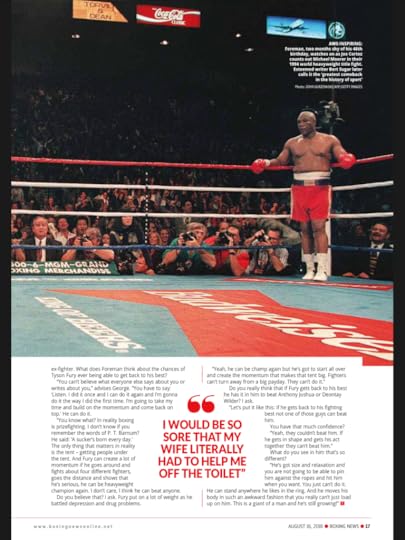
July 24, 2023
Stealing Sgt. Pepper
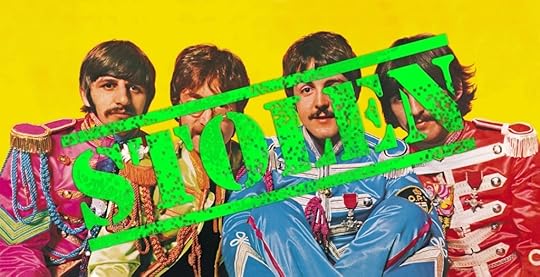
Reblogging this. It’s an old one. Almost 10 years old.
One of the difficult things about having kids – in my case having one kid – is being forced to defend immorality. Specifically, my own immorality.
This morning while walking my soon-to-be-twelve-year-old-daughter to school I took it upon myself to get all misty-eyed and nostalgic. We were talking about music: and my sentimental tears were almost palpable as I took Sofia back to my youth and the days before cassette tapes (which she has never seen!) when for some reason my dad bought me a gigantic industrial reel-to-reel tape recorder. I think he bought it in the pub.
It was a magical thing. It enabled you to record sounds. You could speak into it and then replay what you had said. I felt privileged to own it.
The first thing I did with my new machine was to start borrowing my friends’ records and taping them. By taping them I mean holding the microphone up to my dad’s giant Russian radiogram’ speakers when everyone was out and not making a sound for the entirety of the record.
This was quite illegal, of course. But I was my daughter’s age at the time and had no concept at all of morality; well, morality in relation to stealing recorded music from a vinyl disk as opposed to stealing sweets from a concrete and glass shop (which I also did). I wasn’t a lawyer. It didn’t occur to me that I was doing anything wrong. When you played a record the sound simply drifted off into the ether. Didn’t it? And what could possibly be wrong with recording that sound as it made its journey into nothingness? In actual fact, wasn’t I merely giving that music the respect that it deserved?
As we walked I told Sofia of my friend Dean Hooper. And how I would sometimes walk home from school with him and call into his house. There, his brilliant mother, a Beatles fan who owned all of the LPs in original mono, would lend me records to tape. Thus in 1976, at the height of punk and fully nine years after its release, I finally got my hands on a copy of Sgt. Pepper. It was then, I told Sofia, that I first heard the epic and amazing ‘A Day In The Life’.
This was my cue to wax lyrical about that endless E-Major chord, the strange voices on the run-off groove that said ‘We’ll fuck you like a superman’ if you played the record backwards; the allegories and similes and metaphors that critics have droned on endlessly about ever since. But then Sofia interrupted my musings with a simple question. ‘Wasn’t that stealing?’ she asked.
Sofia is a bright spark. To digress, I received a letter from her school yesterday telling me that she was ‘gifted and talented’ in something called ‘Design Technology’. When I mentioned this to her she told me it was cooking. But back to the story:
I spluttered a bit and tried to think on my feet. Of course it was stealing, I said. But not really stealing. Oh, OK it was stealing. But not intentional stealing. And then I spluttered a bit more.
It wasn’t an argument that I was ever going to win. Because unlike myself at her age Sofia is well aware of the implications of illegally downloading music and movies. She knows that it is called pirating and is not to be done. She knows that it robs creative artists of their upkeep (and being an alleged ‘creative artist’ myself, I should perhaps know better!). And she knows that by recording Sgt. Pepper’s Lonely Hearts Club Band (stupid title) I was robbing the Beatles of an honest income.
But, to quote Paul McCartney from a quite dreadful song on Venus And Mars ‘then it occurred to me. I couldn’t be bad…’. Because when I thought about it I’ve actually purchased Sgt. Pepper six times since I stole it all those years ago.
First there was the stereo version that I bought in a record shop in Gloucester Road in Bristol in 1977 for £3.60 (Yes, I really do have a memory like this!); then there was the second-hand mono copy that I bought in 1983 because mono is better, don’t you know? Then there was the CD copy that I purchased in 1987 because the sound was supposed to be ‘clearer’ (it wasn’t and it never will be because vinyl really is better than digital (it’s scientifically proven)). Then there was the copy that came with the Beatles remastered CD box set that I bought, what… four years ago? That was followed by the Beatles remastered Mono box set that I purchased soon afterwards (because mono is better, don’t you know?). Then there was the digital Beatles remastered box set on a USB card that I bought because it might become a collector’s item (it’s still sealed if you want to make an offer).
And I’m not mentioning the fact that I own a copy of Lennon’s ‘Imagine’ album – not the original 1971 album but another that came out in 1989 to accompany a film by that name. This also has ‘A Day In the Life’ on it, making it in all my seventh copy of that song. Quite ridiculous.
So I think, all in all, that the Beatles have had their money’s worth out of me. And that, I believe, opens up an interesting question: Would I have bought Sgt Pepper legitimately had I never have bootlegged the LP as a teenager?
The answer? Most probably yes. In fact, definitely yes. But I can think of lots of other records and indeed movies that I have later purchased after listening to or watching a pirate copy.
I bought them because I wanted to own them. I wanted to own them because they brought something into my life that a pirate copy did not.
July 16, 2023
Poem
Some may have blamed you that you took away
The verses that could move them on the day
When, the ears being deafened, the sight of the eyes blind
With lightning you went from me, and I could find
Nothing to make a song about but kings,
Helmets, and swords, and half-forgotten things
That were like memories of you—but now
We’ll out, for the world lives as long ago;
And while we’re in our laughing, weeping fit,
Hurl helmets, crowns, and swords into the pit.
But, dear, cling close to me; since you were gone,
My barren thoughts have chilled me to the bone.
December 20, 2022
On the nature of betrayal
And this type of reaction, I will learn, is in the very nature of betrayal. This is what betrayal can do to a person. Because after you discover that the one you trusted more than any other in the world is capable of such profound deception it is inevitable that you will seek out further examples of equivalent duplicity. And in doing so every memory that you share or have created with this person is suddenly open to reinterpretation. Every experience that you enjoyed or endured with this individual can never again be completely trusted. Meaningless incidents from your past will now be scrutinised with different eyes and from a different perspective. Your entire personal history will be cast into doubt. Every moment that you spent with this person has potential for untruth. Events which you thought were essential or inessential components of your personal evolution can no longer be taken as written. And the more that you dig the more you unearth. And the more you unearth the less steady becomes the ground on which you tread. And eventually that ground will give way and the foundations of your existence will crumble to nothing. And the hole in your life that remains is what it means to be betrayed.”
September 19, 2022
The Queen is in the altogether
More often than not it’s been to my detriment that I happen to have been born with a personality that naively tends to question everything. Rather like that little boy in the Hans Christian Anderson story who refuses to deny the evidence of his own eyes, I tend to blurt things out without thinking if they don’t make sense to me.
I got myself into trouble in junior school, for example, when one morning in school assembly I refused to close my eyes and say the Lord’s Prayer. This was not through obstinacy or childish petulance or a desire to make any kind of stand. Young as I was I had recently begun questioning the existence of God. It had occurred to me that I had yet to see any concrete evidence that such an entity existed. In my innocence, it seemed a little unnecessary and pointless to be saying thank-you to someone or something that was not real.
Prior to this epiphany, like everyone else at my school I had been swept along with the ceremony that accompanied religion. Upon instruction I had dutifully placed my hands together and closed my eyes and prayed to this mighty invisible deity whom everyone seemed completely convinced was a real actual thing. Despite the fact that nobody had ever seen him.
Similarly, I would regularly press my hands together and whisper thanks for the meal that I was just about to eat – even though I was pretty sure that God had made no contribution to the preparation of the food in question. It was usually my mum or my grandma or the man in the chip shop or one of those frightening looking school dinner ladies who cheerlessly served up dribbles of slop and square pieces of pie filled with some kind of meat. If you’re going to be thanking anybody for what you’re about to receive surely it made more sense to be thanking these people?
My punishment for that morning’s premature existential crisis was to be swiftly hauled out of the school assembly hall by a tutting Deputy Head and locked alone in an office with the threat of the cane hanging over me. I was probably about nine years old and the injustice of my predicament did not escape me. In very clear terms I as being told that it was wrong to question. That it was a crime to reach a logical conclusion based on the evidence of one’s own eyes. That there apparently existed certain things which one was forced to believe in no matter how illogical they might appear. Furthermore, any refusal to toe the party line was not to be met with intellectual discourse and debate but with violence.
In other words, believe in the existence of some sort of great invisible deity who happened to be very old, white and male; who was everywhere at the same time; who created and destroyed everything in the entire universe; who governed every decision, large or small, that we made throughout every single day of our lives; who provided us with every meal that we ever ate without ever once making an appearance in the kitchen; who killed innocent children for no reason whatsoever; who made the flowers bloom and the bees sting; who gave you cancer; who caused thunder and lightning and plague and pestilence and war and peace. Believe in an entity that did everything at all times for all people, all animals, every insect that ever crawled in the dirt. Believe that this creature exists or the Headmaster – not God this time, mind you, but the Headmaster – is going to pull down your pants and whack you on the bare bottom with a piece of wooden cane that has been manufactured for the sole purpose of torturing children.
Believe that the emperor who stands before you completely naked with his tiny little cock swinging in the breeze is actually fully dressed in a suit of the finest ermine or we will beat that belief into you. Amen. Praise the Lord.
***
Fast forward twenty-odd years and that little boy is now a grown man working as a boxing writer and sitting under dazzling ringside lights at the Royal Albert Hall. He is there to report on a world title fight. And just as it was all those years ago there is the sound of tutting in the air. This is because the National Anthem is currently being played and I am refusing to leave my seat.
***
I’ve been fairly quiet in the days since Queen Elizabeth II died and the country has become gripped by some sort of mass monarchy mourning madness. A period in which every other problem in the world, be it major, minor or catastrophic seems to have been relegated to the foot of the National League while our late monarch sits thirty points clear at the the top of the Premiership. When every second of every minute of every hour broadcast on our mainstream television stations is devoted exclusively to the Queen, the Queen’s family, people who have met the Queen, people who have never met the Queen and people who are willing to queue for 24-hours in order to walk past the lifeless body of the Queen.
On just two occasions I have bitten the bullet and Tweeted an Angry From Tunbridge Wells type of rant that has earned me a handful of likes and comments. Even so, I’ve tried to be careful. Grief, it goes without saying, is a powerful thing. Most of us have experienced personal grief and it is something that cannot be taken lightly. But on this occasion personal grief seems to have been transmuted into a form of mass public mourning that we have probably not experienced since the death of Diana Spencer some 30 years ago, as it happens another member of the royal family.
But what are we grieving for? Who are we grieving for? While it is true that the late Queen certainly managed to put herself about a bit during her well-travelled 70-year reign, it’s probably safe to say that most people in this country never got closer than 100 yards or so to the royal presence. Moreover, even if they did somehow manage to get within touching distance of the old lady they were lucky if they got so much as a handshake. And yet from the reactions that we are witnessing in the media it is almost as if thousands and thousands of people have lost an actual member of their family. As phenomenons go, this is certainly a puzzling one.
For my part I’ve never met the Queen. I caught a glimpse of Prince Edward and his minder in Soho one evening in the nineties but that’s as close as I’ve ever gotten to sharing oxygen with a member of the Royal Family. I’ve walked past Buckingham Palace on more than a few occasions but never taken a look inside. And although I lived in London for over 30 years I was never once tempted to take my place in the crowd and watch the Changing Of The Guard or any other ceremony which might involve an appearance by our monarch. It never occurred to me to do so. I was usually doing something else.
Naturally, I am not unaware of the Queen’s presence in my life. Like everyone, before the advent of contactless I carried pictures of her in my pocket for years and years. Not to mention disks made of copper or silver or aluminium engraved with her likeness. Furthermore, I’ve lost count of the number of times that I’ve licked the back of her head. Although these days it has to be said that she comes in sticker form, which is more practical but somehow not as satisfying.
Yet even though in the course of my life I’ve probably owned or handled more pictures of this woman than those of my own mother I’ve never been interested in watching her say something to me on the television on Christmas Day. Moreover, I’ve never tuned into any of her special, custom televised speeches that have been commissioned in times of need. Although I did accidentally catch the edited highlights on the News of the ‘annus horribilis’ speech in 1992 after the aforementioned Diana died in a car crash. And in the week since the Queen’s sudden death I’ve also heard recordings of her saying ‘we’ll meet again’ on the TV about 4,000 times. This, we are told in reverential tones by sombre faced TV presenters and studio guests, ‘helped the country get through the pandemic’. Surely Vera Lynn and the Pfizer corporation might have something to say about this? For myself, however, I can only reiterate that I haven’t met her and as such there’s certainly no chance that I’m going to meet her again.
So why haven’t I met her? And why haven’t I wanted to meet her? And why does it set my teeth on edge when I think of her, and her children – he with the angry pen face. And the other one – the one who recently paid £millions to stop an American woman from going on about how he fucked her at a party hosted by a convicted paedophile while she was underage and didn’t really want him to fuck her. Or the youngest, a filmmaker or something, isn’t he? Or the daughter, the one who rides horses. Why does it bother me that members of the public are compelled to bow and curtsy or take the knee in the presence of this plummy-voiced version of the Sopranos?
Don’t get me wrong. I am not unaffected by her death. It is undeniably sad when anybody dies. And it doesn’t matter how rich or posh or privileged you are it hurts to lose a loved one. Grief is real and is not to be mocked. It is not, therefore, my intention to add to another’s grief, be it friend or foe. When one suffers a loss everybody should be allowed to cry it out. Never forget, for example, that some people cried when Adolf Hitler shot himself and his new bride in that Berlin bunker after, one assumes, spectacularly unsuccessful nuptials back in 1945.
(Confession: when the Queen’s death was announced on that damp Friday afternoon for a few moments I found myself welling up. This was because I had previously placed a substantial bet with Ladbrokes that she would live to be 100. (That last sentence is not true. I didn’t do that. It was a tasteless joke thrown in for the purpose of bathos. In truth, I literally have no idea at all why I was on the verge of tears. Discovering the reason for this is, perhaps, partly my purpose for writing this article.))
Although I am not unaffected by her death I am most assuredly affected by her life, as are we all. I am equally affected by the lives of her progeny and the lives of her ancestors. What those lives are and what they represent to what we do and what we achieve in our own lives is important to every single one of us.
Let me try to unravel this mystery by telling you what the Royal Family is not: in common with that God entity thing I was talking about earlier these people are not supernatural. They might tell you that their blood is blue but it is just as red as the blood that flows through your own veins. They are not godly. They are not divine. They cannot walk on water or perform miracles. Their accents may be so posh that they have actually claimed our language as their own (the ‘Queen’s English’ or ‘King’s English’ as I guess it is now known.) but they still have to sit on the toilet and take a shit. And sometimes that shit is runny and probably smells really, really bad with some of the things they have to eat while on tour in some of the less enlightened parts of the Commonwealth. They piss. They fart. They puke. At one point or another most of them have probably left skiddies in their underpants. And I’m sure that they masturbate. They must do. Although perhaps they have someone to do that for them. (“Time for your evening wank, Your Highness…”)
In other words, they’re a fairly unremarkable example of where the Homo Sapien species stands in 2022 after approximately 300,000 years of evolution. Admittedly, their average height is taller than a lot of their contemporaries, on account of generations of hearty banqueting. This advantage, however, is offset by the fact that they’ve all got the baldness gene, perhaps, after all, the proof I had been looking for that there is a God. You can cover them in as much gold and jewels and fur as you like but underneath they are all just like Andersen’s emperor: a little flabby, a little pale, a few liver spots here and there. Quite ordinary really.
Which brings us to what the Royal Family is: Let’s begin by addressing the elephant in the room. Money. Loot. The Royal family is, of course, very rich. Very, very rich indeed. Let’s not dwell on individuals (although King Charles’ net worth apparently stands just short of £600 million – and he’s never even made a pop record or kicked a football in anger) but it is estimated that the royal family currently holds some £24billion in assets. That’s a lot of assets. Assets mainly in the form of property and treasure. They even own the ground that we walk on. Freeholders be warned – you don’t really own the land that you purchased; in reality your land is sitting on top of land that is owned by the royal family. So now you know how us leaseholders feel.
And where did all these billions come from? While it is undoubtedly true that a decent chunk of that 28billion has been accrued as a result of legitimate business dealings conducted over the last century or so there is no getting away from the fact that most of it has been stolen. We’re talking here about more than 1,000 years of robbing and stealing and pillaging on an industrial scale. Stealing from other countries. Stealing from other countries whose version of God didn’t quite tally with whoever was on the throne at the time. Stealing from their own countrymen. Stealing from God. (Short of cash at the moment? Need a new wife? Why not invent a whole new sub-genre of Christianity? You can call it The Church Of England. That way you get to loot all the monasteries – you can keep all the gold and the property for yourself. Henry VIII: ‘Splendid idea. Now it’s time for my evening wank…’)
History tells us in no uncertain terms that the royal family is a dynasty built upon a bedrock of misery, of torture, of pain, of exploitation, of blood and unprecedented brutality. Detractors’ intestines cut from their stomachs and their limbs pulled apart by horses. Public burnings. Beheadings. People boiled alive in the royal court as the king casually looked on. If Netflix ever decided to film the true version of The Royals the level of violence would render it unwatchable.
But stop. You can’t blame The Queen for all of this. We’re talking about her ancestors. Different times. Different people. The Queen, her subjects will rightly tell you, was never anything but nice and kind and cuddly. She loved to laugh. She had a sarcastic side. She was dutiful. She liked dogs and horses. Why, she once let Michelle Obama touch her. She pledged her life to her people. You can’t blame Charles either. He talks to plants. He cares about the environment. He believes in reincarnation and hopes to return as a Tampon. (Woe betide you, however, if you don’t move that pen in time.)
No doubt all of this is true but it doesn’t stop my nervous tick whenever I see a line of people standing to attention waiting to meet a member of the royal family. Because this one act of subservience means so little but so much. For just like the little boy who all those years ago refused to recite The Lord’s Prayer in assembly I find myself asking questions which need to be answered.
Why are you bowing to that person in the jewels? What has the person achieved in life that they should demand such respect from you? Why do you feel the need to kowtow to this person? If you were to somehow find yourself alone on a desert island with this person what could he/she offer that you could not?
Scrape beneath the surface and there is really only one answer to all of those questions. And it’s an answer which both defines and condemns the society in which we live: Position.
We bow and we kneel and we curtsy because they are up there and we are down here. That is the simple truth. As an institution the royal family is the ultimate embodiment of cultural nepotism. In other words, the class system. A system which has evolved over time to ensure that the powerful remain powerful and the weak remain weak. And it’s a system that’s working very well, thank you very much ma’am. It’s a system that is potent enough to induce the kind of mass hypnosis that we are currently witnessing. In which a whole population is looking at the monarchy and seeing what the establishment wants it to see. It is the mirror opposite of a meritocracy.
As I remain that little boy waiting for the cane I will concede that I have nothing personal against any member of the royal family. I don’t know that much about them to be honest and cannot see myself ever being interested in what they have for their dinner or how many grouse they have shot that afternoon. Proponents of the monarchy will argue, of course, that the royal family earn their keep in attracting tourists, etc. They hold the country together. They help a lot of underprivileged kids. Arguments such as these are regularly trotted out on demand. But I don’t see France having a problem attracting tourists. Or other countries falling to pieces for lack of a billionaire figurehead. Likewise, there are still plenty of underprivileged kids to be found on the streets in every corner of the UK.
As this rambling monologue reaches its conclusion I once more stress that this is not a personal attack on any member of the royal family. After all, we are reminded, it’s not as if any of them applied for the job that they find themselves doing. They are born into the establishment and perpetuate it, just as by permitting its continued existence we ourselves perpetuate it. Nothing short of revolution is ever going to put a stop to this patently unjust system.
And for that to happen it’s going to take more than one little boy waving his finger at the emperor’s naked bellybutton. It’s going to take a whole population of people who cried because they thought that Queen Elizabeth II was actually a member of their own family to dry their tears and start polishing their spectacles. More importantly, the emperor himself is going to have to take a long hard look in the mirror and realise that the time for returning those things that were stolen from others is long overdue.
July 30, 2022
Showreel
A short showreel of some of the music I’ve produced recently. If you want to hear more there are another 350+ available to download for free at https://sidetrax.co.uk or https://soundcloud.com/user-149883042.
June 26, 2022
New watercolour
I’m back painting a little more regularly for the first time in about two years.
This is one I did last week of my daughter, Sofia. She was about 3 at the time. It’s one of my favourite photos of her.
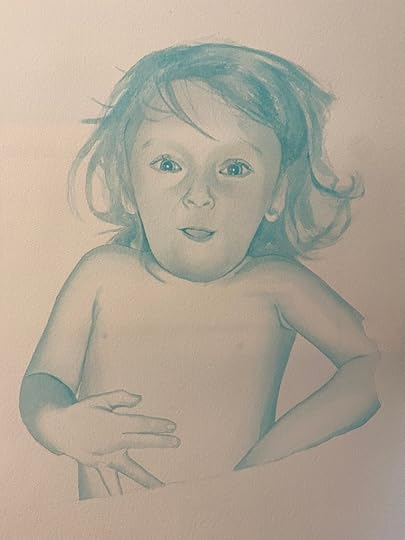
May 24, 2022
First watercolour in two years
April 25, 2022
Sorry seems to be the easiest word – what a real apology looks like
Too many people think that simply mouthing the word ‘sorry’ is enough to absolve them of their sins and let them off the hook – no matter how horrendous the things they have done.
Want to know how a real apology should look? I’m linking to this excellent article from the Chumplady website, which explains things in her usual brutal but succinct manner.
Real Remorse? Or Genuine Imitation Naugahyde Remorse?

